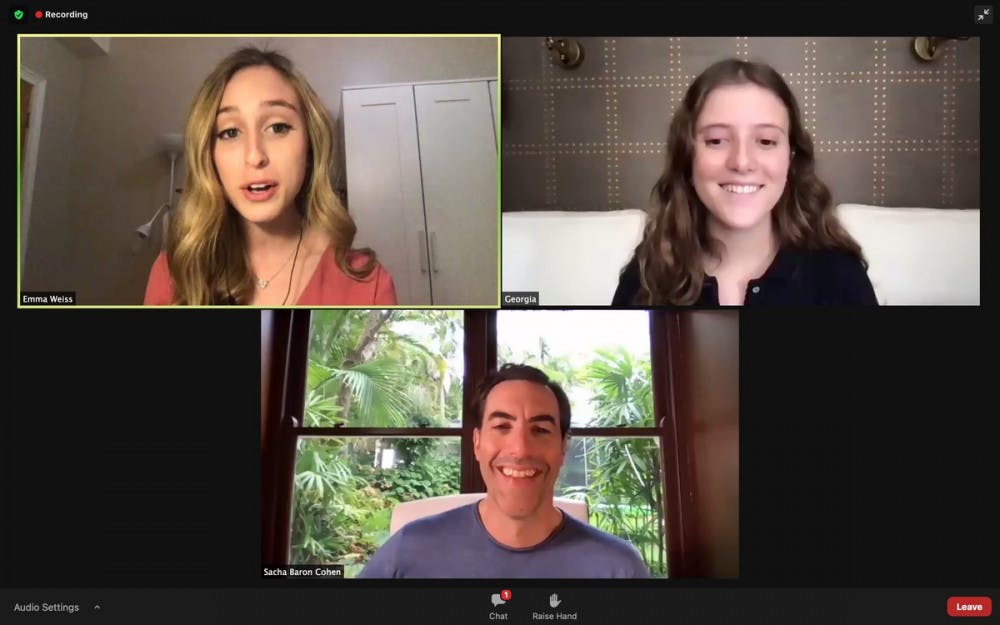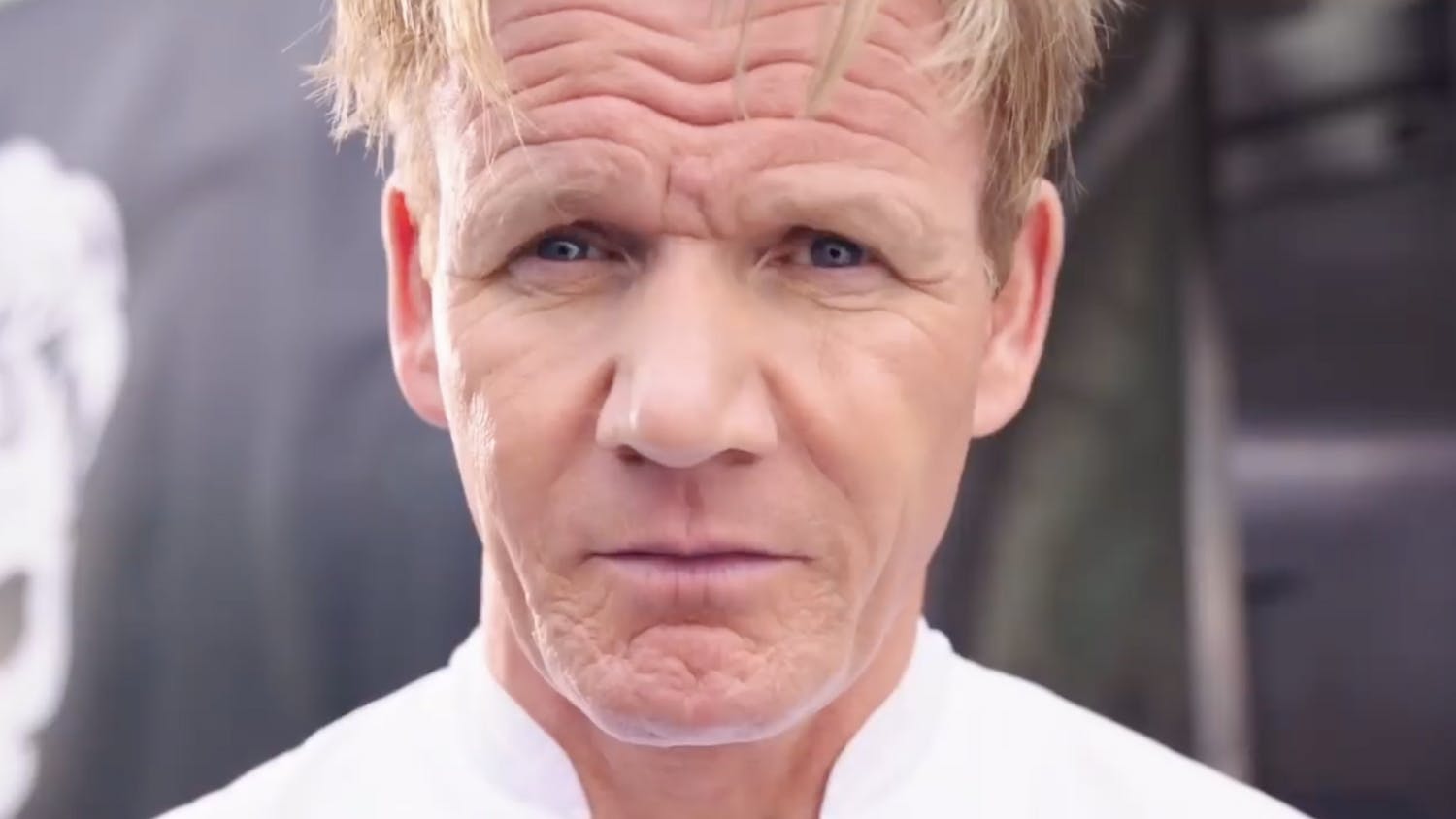Actor, comedian and producer Sacha Baron Cohen joined Ivy Film Festival for its 20th Anniversary Festival Week Tuesday evening.
Baron Cohen was introduced by IFF directors Grace Attanasio ’21.5, Jessica Dibble ’21, Sasha Pinto ’21 and Claire Zhang ’22, and was then interviewed by screenplay team coordinator Emma Weiss ’21 and industry team coordinator Georgia Salke ’23. The English actor is best known for his notable comedic personas including Ali G, Bruno Gehard of “Bruno,” Admiral General Aladeen of “The Dictator” and the raunchy Kazakh journalist Borat Sagdiyev of “Borat,” whose sequel film, “Borat Subsequent Moviefilm,” was released in October 2020.
As a young boy growing up in Northwest London, Baron Cohen knew no one in the entertainment industry, and “felt a bit embarrassed” to tell his friends that he wanted to be a comedian. But he went to the University of Cambridge with the main purpose of joining the Cambridge University Footlights Dramatic Club, a theatrical club founded in 1883 with notable alumni including the members of comedy group Monty Python, who Baron Cohen described as his heroes. He tried out nine times for the Footlights, but was rejected, so he auditioned for some of the “straight dramas.”
“I had never acted before, and someone gave me a role but pretty soon after they realized I couldn’t act and fired me from this play,” Baron Cohen said. “At which point, the rest of the cast really liked me and said ‘if you fire Sacha, we all leave,’ so I performed this Chekov play and got away with it.” From there, Baron Cohen’s acting career began.
“Borat Subsequent Moviefilm” was born out of Baron Cohen’s worry about former President Donald Trump winning a second term and “undermining the democratic institutions in America.” He thought that if he brought back his most popular character, Borat, and made and released a film prior to the November election about a new character, his 15-year-old daughter Tutar Sagdiyev infiltrating Trump’s inner circle, he could share this message.
“I knew if I made her look a certain way… that possibly, we could get her to infiltrate Trump’s inner circle,” said Baron Cohen. “I wanted to highlight the misogyny that was at the base and core of that regime, because I knew if I could do that and put out a mass movie before the election and (remind) women that this was inherently a misogynistic regime, this might compel some young women to go out and vote.”
Sagdiyev was played by Maria Bakalova, a Bulgarian actress who had recently graduated from the Krastyo Sarafov National Academy for Theatre and Film Arts before joining the film. Baron Cohen shared that he sat through over 600 auditions throughout Eastern Europe and the United States before finding Bakalova.
“We needed somebody who was a brilliant actor, someone who was emotional because fundamentally we knew that if the movie was going to really work, you had to care about the relationship between Borat and his daughter,” he said.
Baron Cohen also said he needed someone courageous and funny. He told Bakalova that if she was able to “pull off” the role, she would be nominated for an Oscar, which she was, along with nominations for a Screen Actors Guild Award and Golden Globe Award.
Baron Cohen noted the complex nature of playing a “lovable villain” like Borat, due to the fact that the satirical character is misogynistic, antisemitic, racist and anti-democracy, yet people still love him. In order to achieve this, Baron Cohen sought to play Borat with some naivety, by toying with the concept that Borat does not realize he loves his daughter.
“The pleasure of tension for the audience is ‘when is he going to realize he bloody loves his daughter?,’ and ‘when is he going to give up this crazy, misogynistic outlook … and become a feminist?,’” said Baron Cohen. “The emotionality and the empathy and the humanity is what pulls you through the entire movie and stops it from being just a series of sketches.”
After discussing Borat, the conversation transitioned to another one of Baron Cohen’s latest movies, “The Trial of the Chicago 7,” where Baron Cohen played Abbie Hoffman, one of his heroes from when he was in college. Baron Cohen explained that as a young Jewish man in England, he did not know many people like him. When he was in university, he wrote his thesis on Jewish left-wing radical students who went down in the American South in the early 60s to fight racism — one of those students being Abbie Hoffman. Baron Cohen was proud that Jewish students were active in the fight against racism and even traveled to the United States to visit civil rights sites while he was a student.
Thirteen years ago, he found out that Steven Spielberg was creating the “Trial of the Chicago 7,” and asked to audition for the role of Abbie Hoffman. Spielberg told him that if he could master Hoffman’s Boston accent, he would have the role. At the end of two weeks, with the assistance of Spielberg’s dialect coach, he had mastered the accent and received the role. But following the 2007-08 Writers Guild of America Strike, the deaths of two cast members who were supposed to be in the movie, Heath Ledger and Phillip Seymour Hoffman, and other barriers, no progress had been made.
Eventually, Baron Cohen heard that Aaron Sorkin would be directing, and even though 13 years had passed, he landed the job. But due to his conflicting schedule, he had to shut down the filming of Borat for a period of time.
“I say to the team, ‘I’ve got to shut down Borat. I’ve got to play this role and they say ‘you’re crazy, we’re making Borat so it can be released for the election, this is such a tight schedule,” and I go ‘I’ve got to do it, I have to play this role, I’ve been in love with this guy since I was 21,’” Baron Cohen said. “And we shut down Borat.”
Baron Cohen also discussed the role his identity and “otherness” as a Jewish man has played in his personas such as Ali G, which he thinks led to the embrace of such characters by diverse communities.
“I think my otherness allowed me to inhabit these characters that are very un-English … it was those ethnicities that felt a little bit other, they were the ones who embraced him because he was one of the first characters that was not fully white, but we left it obscure as to what Ali G’s ethnicity was,” he said.
To conclude his talk, Baron Cohen discussed his organization, Stop Hate for Profit, which “holds social media companies accountable for hate on their platforms.”
“We’re going to have to stop these billionaires making money and spreading lies that kill,” said Baron Cohen. “We’re going to have to get governments, the people that we elect, to bring in some laws to curb their greed and to make sure the internet protects the things that we love while still guaranteeing freedom of speech.”

Rebecca Carcieri is an arts & culture editor. She is a senior from Warwick, Rhode Island studying political science.





